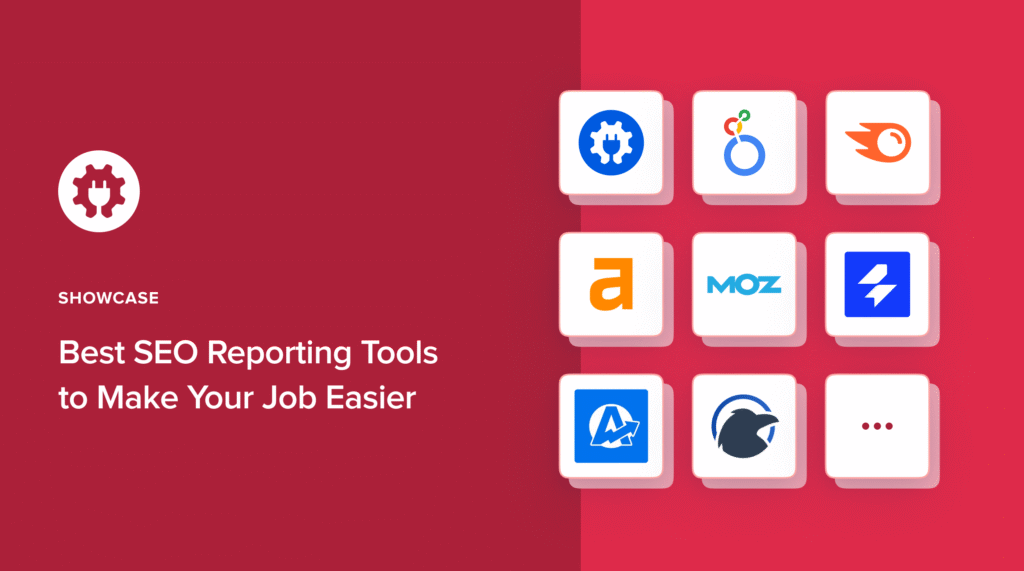Looking for the best SEO reporting tools to keep tabs on your site’s performance?
When I first started working in SEO, I used to manually copy data from Google Analytics and Search Console into spreadsheets. It took hours every week, and the reports were still messy and hard to explain. Clients would ask questions like, “Are we ranking better for our main keywords?” and I didn’t have a clear, simple answer.
That’s when I realized something needed to change. And getting proper SEO reporting tools was the start. With the right tools, I could track keyword performance, monitor traffic, and highlight wins without wasting time. More importantly, the reports made sense to non-SEO people. They could instantly see what was working and what needed fixing.
In this post, I’ll share the best SEO reporting tools I’ve used in my 7+ years as a professional SEO. Whether you’re running a startup, working at a growing agency, or just trying to simplify reporting for your business, these tools can save you hours of work while providing clarity for you and your clients.
In This Article
- What Are SEO Reporting Tools?
- How I Chose the Best SEO Reporting Tools
- The 8 Best SEO Reporting Tools: Expert Picks
- 1. All In One SEO: Best All-in-One SEO Reporting Tool for WordPress
- 2. Google Looker Studio: Best Free Customizable Reporting Tool
- 3. Semrush: Best for Competitor Insights
- 4. Ahrefs: Best for Backlink & Keyword Reporting
- 5. Moz Pro: Best for Beginner-Friendly SEO Reporting
- 6. SE Ranking: Best Budget-Friendly SEO Reporting Tool
- 7. AgencyAnalytics: Best for Agencies Managing Multiple Clients
- 8. Raven Tools: Best for Historical SEO Data & Reports
- 1. All In One SEO: Best All-in-One SEO Reporting Tool for WordPress
- The Best SEO Reporting Tools: My Top Picks
- The Best SEO Reporting Tools: Your FAQs Answered
What Are SEO Reporting Tools?
SEO reporting tools are software platforms that collect, organize, and present data about your site’s search performance. Instead of digging through multiple platforms like Google Analytics, Search Console, and backlink checkers, these tools pull everything into one place.
With the right tool, you can:
- Track keyword rankings and traffic trends over time
- Show which content drives the most visibility and conversions
- Monitor backlinks and authority growth
- Run site audits to find technical SEO issues
- Generate professional, easy-to-read reports for clients, investors, or your team
For example, instead of manually updating a spreadsheet to show keyword movements, an SEO reporting tool can automatically generate a chart that highlights your top-performing keywords. This saves time and makes it easier to communicate results in a clear, professional manner.
How I Chose the Best SEO Reporting Tools
When compiling this list, I didn’t just pick popular tools. I tested them against what actually matters for startups, agencies, and marketers. Here are the main things I looked at:
- Ease of Use: SEO can get complicated fast. I looked for tools that made reporting simple and clear.
- Reporting Features: I picked feature-rich tools that track keywords, backlinks, site audits, and competitor insights.
- Integrations: Accessing multiple data sources in one place saves time. That’s why I looked for tools that connect with Google Analytics, Search Console, and other must-have platforms.
- Customization: Depending on your needs, these tools come with white-label reporting, intuitive dashboards, and scheduled email reports.
- Pricing & Value: I chose affordable options for startups that still deliver big value.
The tools here are a mix of all-in-one SEO platforms, dedicated reporting solutions, and AI-driven tools. No matter your budget or goals, there’s an option that will fit.
The 8 Best SEO Reporting Tools: Expert Picks
1. All In One SEO: Best All-in-One SEO Reporting Tool for WordPress
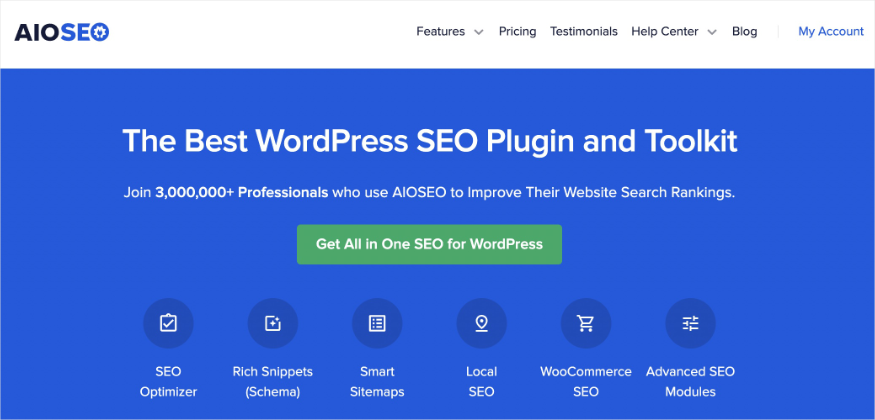
AIOSEO is a powerful yet easy-to-use SEO plugin trusted by over 3 million website owners. It’s built to help you improve search rankings and grow traffic without needing to be an SEO expert.
What sets AIOSEO apart is its mission to simplify SEO. While most tools overwhelm you with complex dashboards and technical jargon, AIOSEO is designed to be beginner-friendly. Everything is no-code, so you don’t need technical skills to optimize your site.
Some of the standout features that make AIOSEO one of the best SEO reporting tools include:
Site Audit
AIOSEO’s Site Audit tool runs a full analysis of your site and gives you an actionable checklist of improvements.
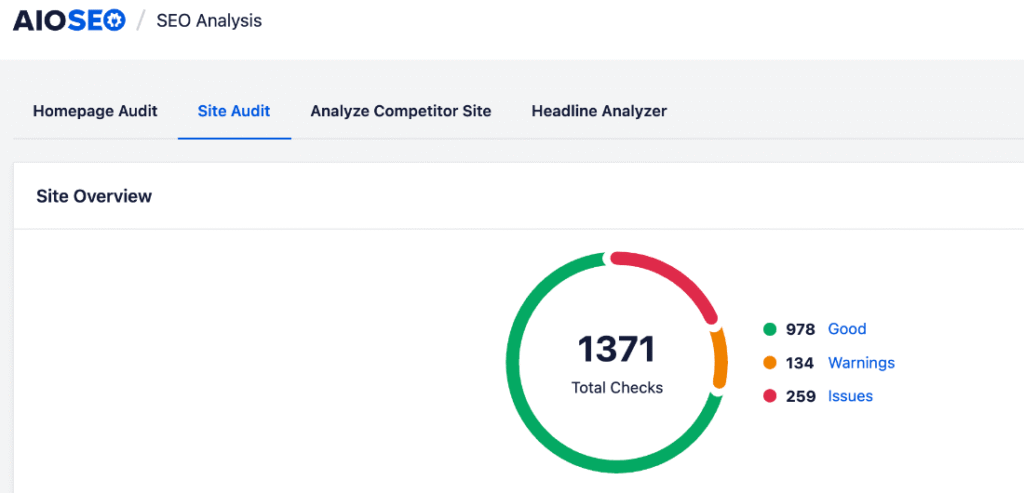
It scans your site and highlights SEO issues, grouping them into 3 categories: Good, Warnings, and Issues. This helps you know what to fix first.
One reason I love the Site Analysis module is that it conducts an in-depth scan of your site.
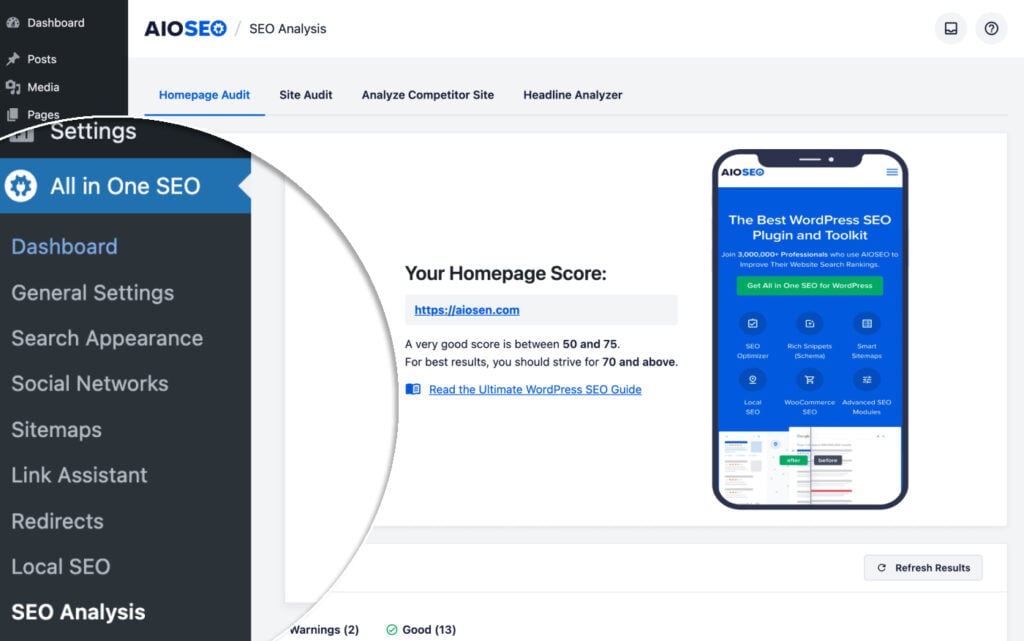
The SEO audit identifies:
Basic SEO Issues
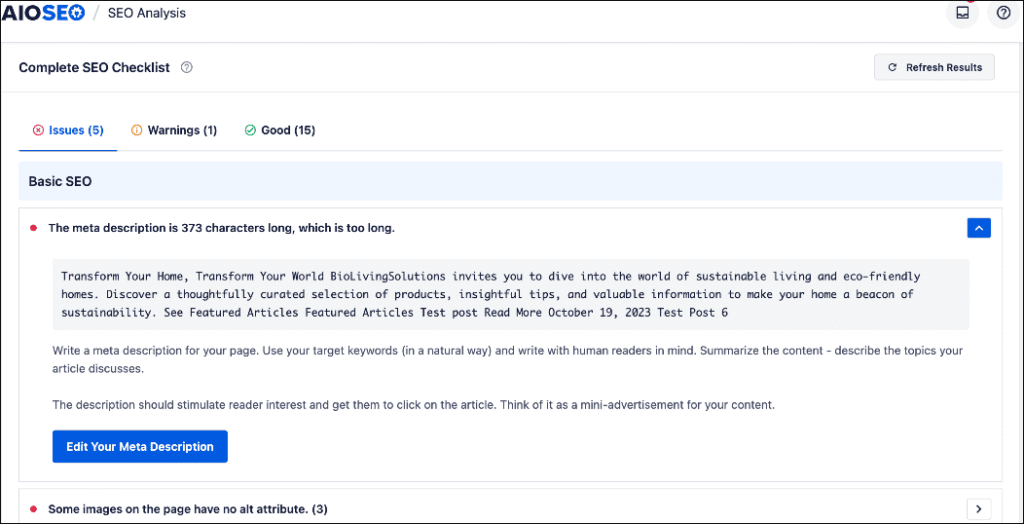
This makes sure critical elements like meta tags, headings, and content structure are optimized right from the start. This helps you catch foundational issues before they impact your entire site.
Performance and Security Issues
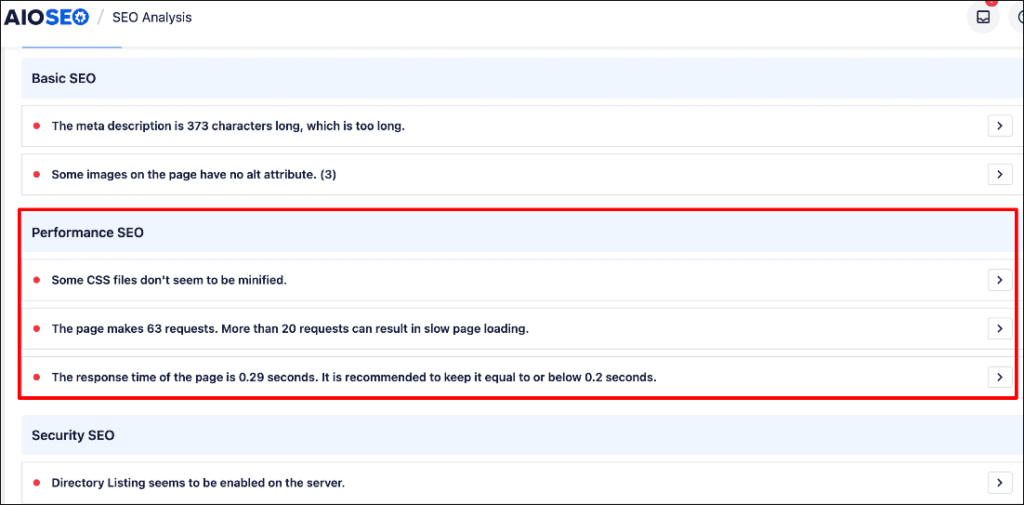
Easily uncover performance bottlenecks and security vulnerabilities that could hurt your rankings and user experience.
The payoff? A faster, more secure site that keeps users engaged and earns greater trust from search engines.
I’ve used the Site Audit tool several times to identify issues that have been holding clients' sites back. The ease of use and visual appeal of this reporting feature make it easy for non-SEOs to understand what’s happening behind the scenes.
Search Statistics
AIOSEO’s Search Statistics feature integrates seamlessly with Google Search Console (GSC) and pulls in key data about your site's visibility and traffic from Google Search.

This allows you to track:
- Total clicks
- Search impressions
- Average click-through rates (CTR)
- Average keyword positions
All of this can be done right inside WordPress, making it simple to connect your SEO efforts with real search performance. On top of that, AIOSEO’s Keyword Rank Tracker gives you access to historical ranking data, so you can track progress over time.
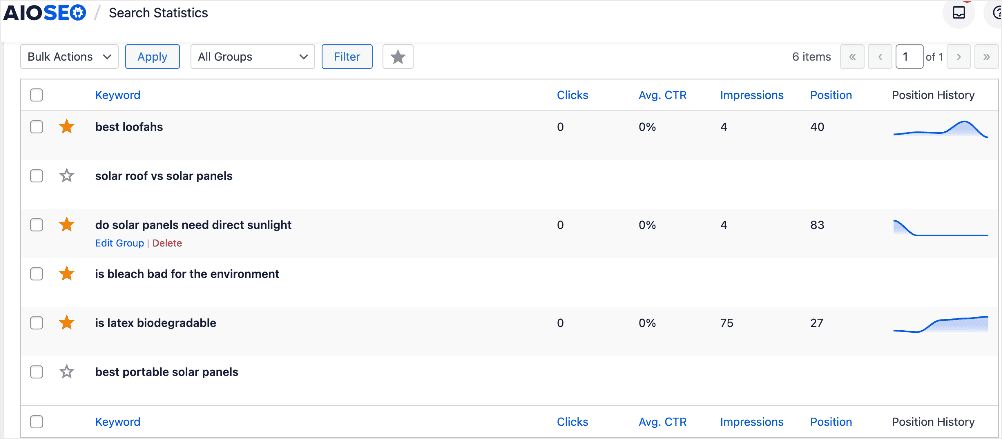
This feature provides valuable analytics on your keywords’ performance, helping you measure the impact of your SEO content strategy.
For step-by-step guidance, check out our tutorial on tracking keyword rankings in WordPress.
Besides reporting on search performance and keyword rankings, Search Statistics also has an Index Status feature.

This helps you quickly see which posts are not indexed, helping you troubleshoot issues quickly. As a result, you can increase your chances of ranking and driving traffic to your site.
Link Assistant
Besides rankings, SEO reporting should also include an analysis of the links on your site. This is because links play a huge role in your on-page SEO, off-page SEO, and technical SEO.
One of the simplest ways to get a clear overview of your site’s links is by using AIOSEO’s Link Assistant.
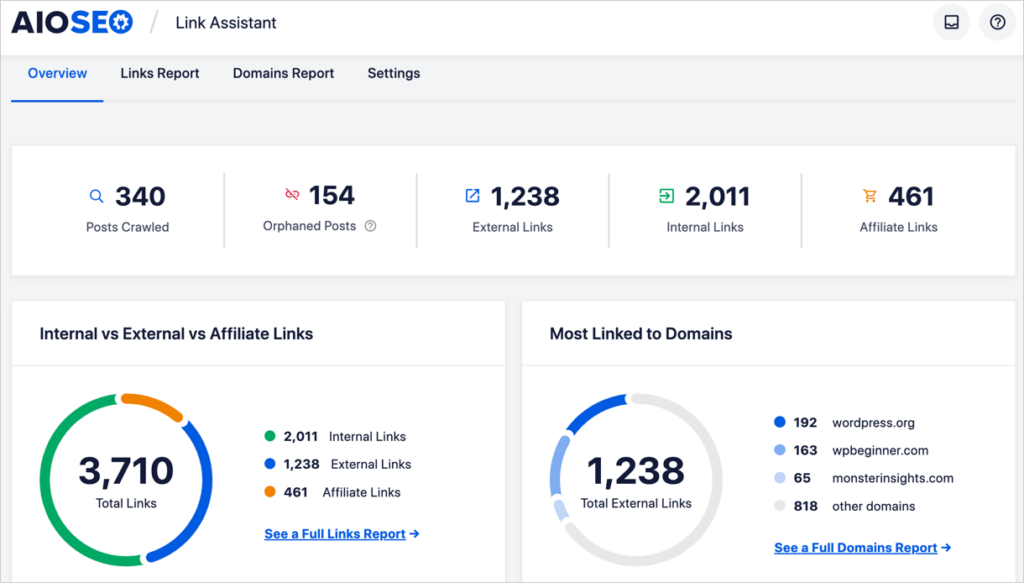
Link Assistant gives you a complete overview of your internal, external, and affiliate links. It even highlights orphan pages on your site.
Beyond the Overview section, you’ll find more detailed insights in the Links Report, the first tab in the in-depth view.
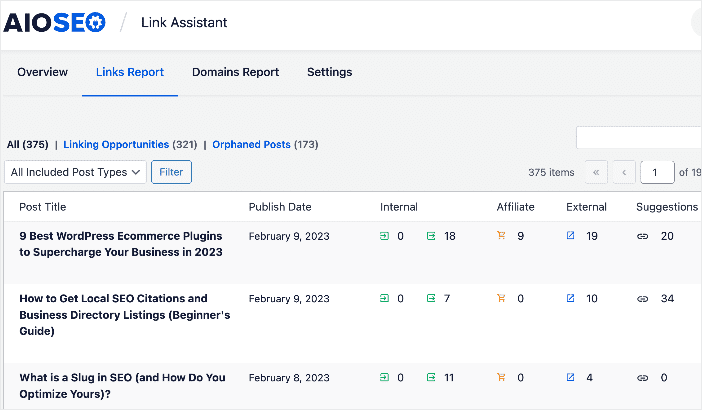
The Links Report shows:
- All internal links (inbound and outbound)
- Affiliate links
- External links
It also gives you link suggestions for each post, allowing you to add them to your posts with 1 click.
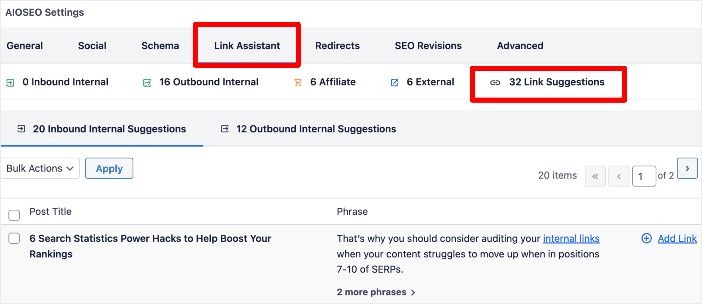
I love that Link Assistant also has a Domains Report. This report shows you the domains you link to the most and the number of links for each.
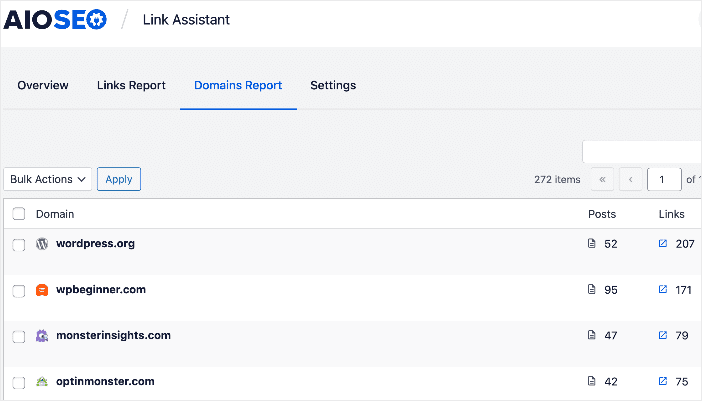
This report has several benefits, including:
- Trust and relevance signals: If you consistently link to authoritative, trustworthy sources in your niche, it reinforces your own site’s credibility. On the flip side, linking to too many low-quality sites can raise red flags.
- Balanced outbound linking: The Domains Report helps you spot if you’re linking too heavily to one site (which could look unnatural). By diversifying outbound links, you maintain a natural linking profile.
- Partnership and outreach opportunities: If you frequently link to a particular site, it’s a signal that a partnership or guest post opportunity might be a good fit.
Internal and external links are crucial components of an effective SEO strategy. This is why Link Assistant is one of my go-to SEO reporting tools.
Automated Email Reports
One simple way to make SEO reporting easier is by setting up automated SEO reports delivered straight to your inbox. With AIOSEO, you can enable this in just a few clicks.
To activate the feature, go to AIOSEO » General Settings » Advanced.
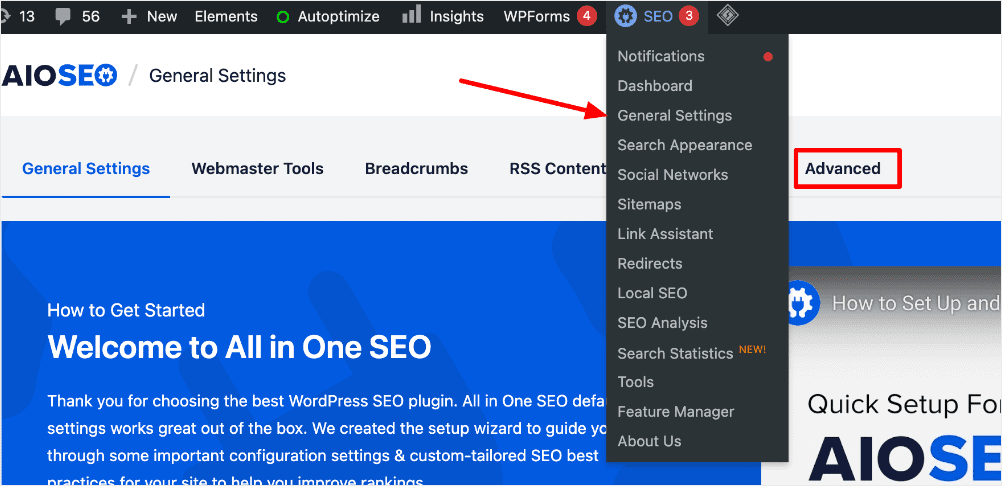
This opens the settings menu, where you can configure various SEO options. Scroll down, and you’ll see a toggle to enable Email Reports:

This will opt you into receiving SEO reports from AIOSEO. Plus, you can also:
- Add as many email addresses as possible
- Set the frequency at which each recipient will receive the report
Automating your SEO reports makes it effortless to stay on top of performance and adjust your campaigns when needed.
For more options, check out our list of the best SEO report generators to discover additional tools for automated reporting.
These are just a few of the features that make AIOSEO the best SEO reporting tool for WordPress. What I love most is how actionable the reports are. Instead of just showing you problems, AIOSEO walks you through how to fix them, step by step. This is a game-changer for startups and small teams that don’t have a dedicated SEO specialist.
Add to that world-class customer support, and AIOSEO easily earns the #1 spot on this list.
Pricing: Free. Paid plans start at $49.50/year.
2. Google Looker Studio: Best Free Customizable Reporting Tool
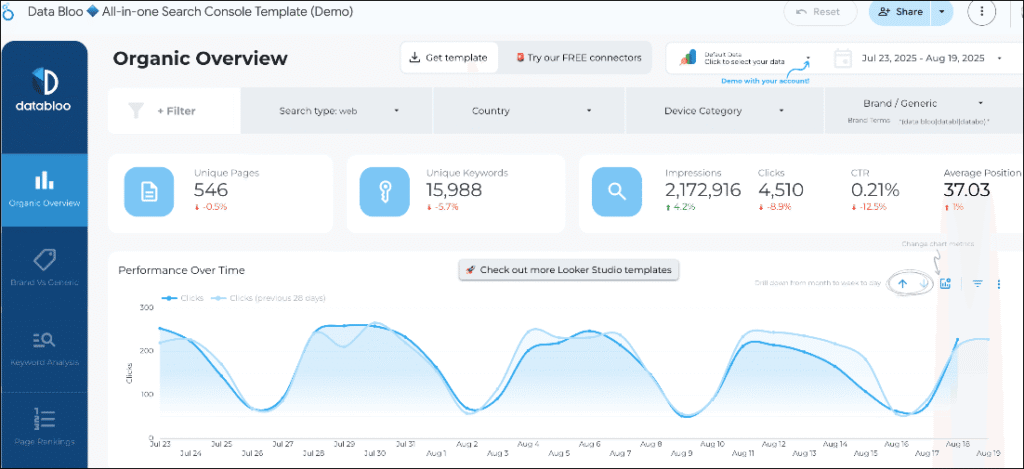
Google Looker Studio (formerly Google Data Studio) is one of the best free SEO reporting tools for savvy SEOs.If you want to turn raw SEO data into beautiful, easy-to-read reports, this is your go-to option.
The biggest strength of Looker Studio is its flexibility. You can pull in data from Google Analytics, Google Search Console, and dozens of third-party sources, then turn that into fully customized dashboards.
For example, if you want a dashboard that shows keyword rankings, traffic sources, and backlink growth all in one place, you can build it here. You can even brand reports with your company’s logo and colors. This is handy for startups pitching to investors or agencies reporting to clients.
Best of all, you can share these dashboards in real time. No more downloading spreadsheets and emailing them around.
The caveat? Looker Studio has a steep learning curve, making it one of the least beginner-friendly tools in the lineup.
Pricing: Free.
3. Semrush: Best for Competitor Insights

Semrush is a powerhouse SEO reporting tool that does a little bit of everything. It’s especially useful if you want both reporting and competitor analysis in one place.
With Semrush, you can:
- Track keyword rankings over time
- Monitor backlinks (new and lost)
- Audit your site for technical SEO issues
- Spy on competitors’ top-performing keywords and pages
What I love about Semrush is that it doesn’t just give you numbers. It gives you actionable insights. For instance, if your competitor gains 50 new backlinks in a week, Semrush can show you exactly where they came from. That way, you can reach out to those same sites for your own backlink opportunities.
The reporting side is strong, too. You can create scheduled PDF reports that land in your inbox (or your client’s inbox) automatically.
Pricing: Starts at $139.95/month.
4. Ahrefs: Best for Backlink & Keyword Reporting

Ahrefs is famous for its backlink database, which is one of the largest in the SEO industry. If backlinks are part of your growth strategy (and they should be), Ahrefs is a must-have.
With Ahrefs, you can generate detailed reports on:
- Who’s linking to your site
- Which pages attract the most backlinks
- Broken backlinks you can reclaim
- Competitor backlink profiles
Beyond backlinks, Ahrefs also gives you keyword tracking and site audit reports. For example, if you’re a startup trying to rank for “AI-powered CRM,” you can track how that keyword performs across different markets and see what competitors are ranking.
I like that the interface is clean and beginner-friendly, even though the tool is powerful enough for pros.
Pricing: Starts at $129/month.
5. Moz Pro: Best for Beginner-Friendly SEO Reporting
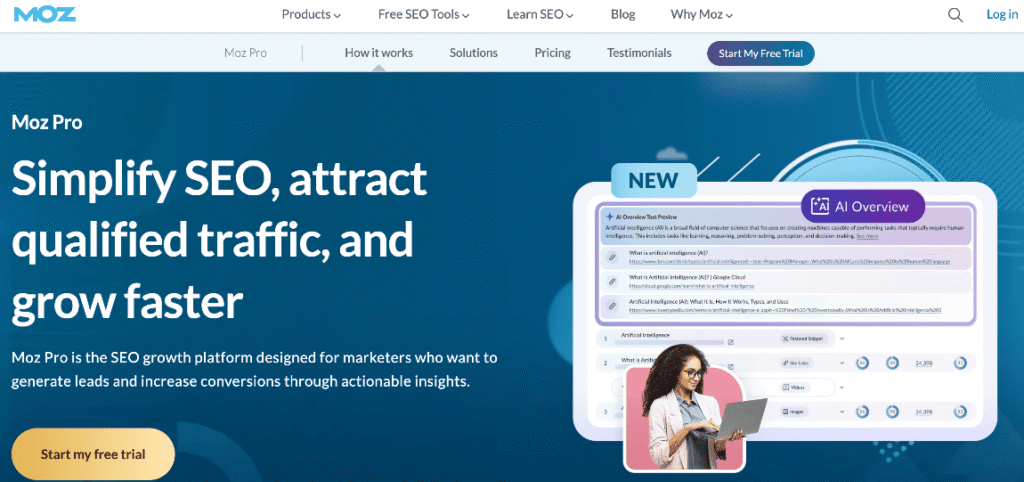
Moz Pro is a great option if you’re just starting out with SEO reporting. It strikes the perfect balance between simplicity and depth, making it a strong choice for startups without a full-time SEO expert.
Moz Pro reports cover:
- Domain authority and page authority
- Keyword rankings
- Site crawl issues
- Backlink metrics
One of Moz Pro’s standout features is its Keyword Explorer. It not only shows you which keywords you rank for but also suggests new opportunities based on keyword difficulty and search volume.
Moz’s reporting is easy to digest, so you don’t get lost in endless charts and graphs. This means you can quickly understand what’s working—and what needs fixing—without hiring an analyst.
Pricing: Starts at $49/month.
6. SE Ranking: Best Budget-Friendly SEO Reporting Tool
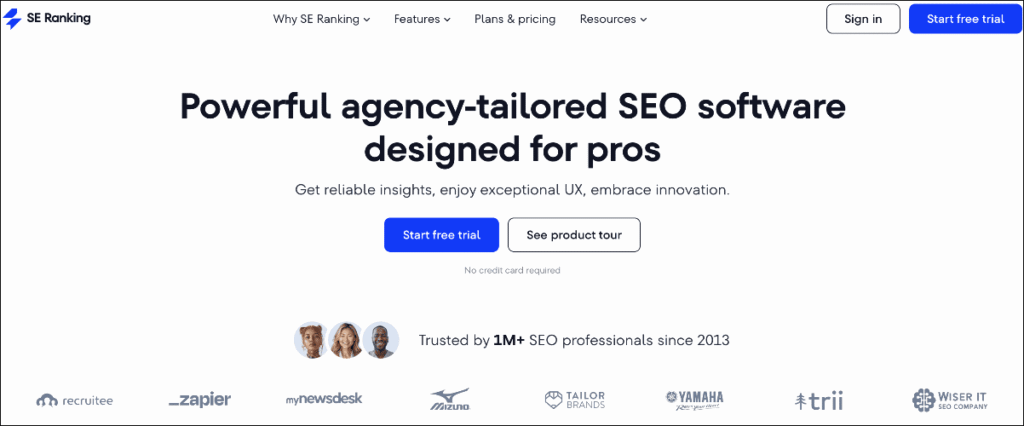
If you’re running on a tight budget but still want a solid SEO reporting solution, SE Ranking is a good choice. It packs a lot of features at a much lower price point than many competitors.
Some reporting highlights include:
- Keyword rank tracking
- Competitor keyword monitoring
- Backlink tracking and analysis
- White-label reports
The tool also integrates with Google Analytics and Google Search Console, allowing you to combine data sources into a single, clear dashboard.
Pricing: Starts at $52/month.
7. AgencyAnalytics: Best for Agencies Managing Multiple Clients

If you run an agency or manage multiple client sites, AgencyAnalytics is tailor-made for managing multiple client accounts.
The reporting is highly customizable, letting you build dashboards with SEO, PPC, social media, and even email marketing data all in one place. That makes it a true “all-in-one reporting hub.”
A few standout features include:
- Drag-and-drop dashboard builder
- Automated, scheduled reports
- White-label options so you can brand reports with your logo
- 70+ integrations, including Google Analytics, Ahrefs, and Semrush
For example, if you’re handling SEO for 5 different clients, you can build separate dashboards for each. No more juggling multiple logins or spreadsheets. The ability to manage multiple sites makes AgencyAnalytics the best SEO reporting tool for agencies.
Pricing: Starts at $59/month (includes 5 clients).
8. Raven Tools: Best for Historical SEO Data & Reports
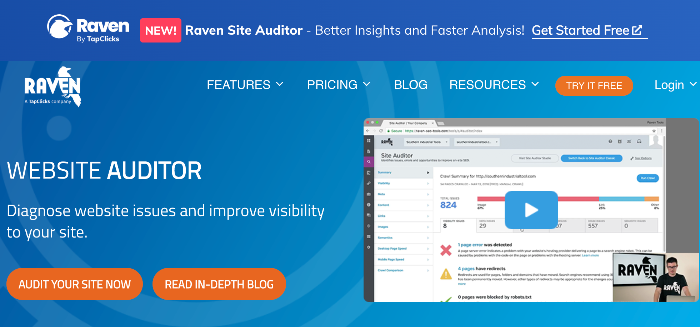
Raven Tools is one of the oldest SEO reporting platforms, and it shines when it comes to historical data. If you want to track SEO performance trends over time, Raven gives you that long-term view.
Its reporting features include:
- Website audits for technical issues
- Backlink analysis
- Keyword rank tracking
- Competitor comparisons
The real value here is in its historical reporting. For example, you can compare SEO performance from this quarter to the same quarter two years ago. That’s extremely useful if you want to show long-term growth to investors or stakeholders.
Pricing: Starts at $39/month.
The Best SEO Reporting Tools: My Top Picks
AIOSEO is the best SEO reporting tool for WordPress users. I love that the plugin makes it simple to track SEO performance, run site audits, and even send automated reports straight to my inbox (or my clients’ inboxes).
Other SEO reporting tools that rank in my top 3 are Semrush for its advanced analytics and competitor insights, and AgencyAnalytics for agencies.
I hope this post helped you discover the best SEO reporting tools for your needs. You may also want to check out my tutorial on how to conduct a website SEO analysis or my list of the best DIY SEO tools.
The Best SEO Reporting Tools: Your FAQs Answered
What is the best SEO reporting tool for WordPress?
The best SEO reporting tool for WordPress is AIOSEO. It gives you clear, actionable insights through features like SEO Analysis, Search Statistics, Link Assistant, and automated email reports.
Unlike other tools that overwhelm you with complex data, AIOSEO makes reporting beginner-friendly by showing you exactly what’s working, what’s not, and how to fix it.
What is an SEO reporting tool?
An SEO reporting tool helps you track how well your website is performing in search engines. It shows data like keyword rankings, traffic, backlinks, and technical issues so you can improve your site’s SEO.
Why do I need SEO reporting tools?
SEO reporting tools are important because they save you time by showing what’s working and what’s not. This enables you to focus on strategies that actually drive growth.
How often should I check SEO reports?
Most businesses check SEO reports weekly or monthly. Startups may benefit from more frequent checks, allowing them to adjust campaigns quickly.
Can SEO reporting tools track competitors?
Yes, many SEO reporting tools let you see what keywords your competitors rank for. They also show you how much traffic they get and where they get backlinks. This helps you spot opportunities to outrank them.
Disclosure: Our content is reader-supported. This means if you click on some of our links, then we may earn a commission. We only recommend products that we believe will add value to our readers.
